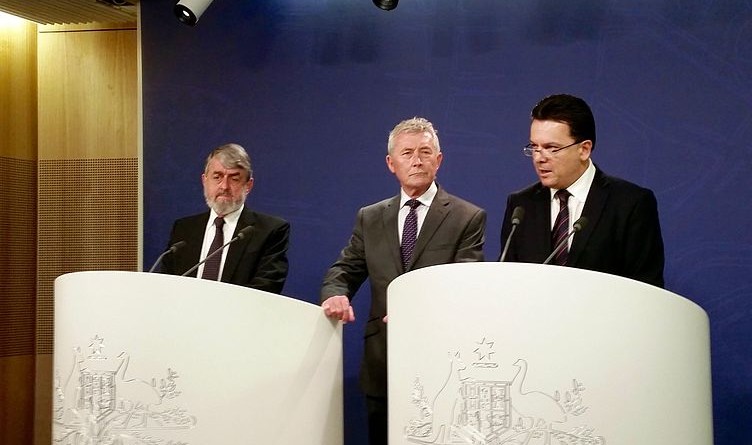Human rights watch opposes any move to prosecute Witness “K” & advocate Bernard Collaery
Human Rights Watch said today that Australian officials ought not indict a previous Australian covert operative and his attorney for uncovering government’s bad behavior, The Magistrates Court in the Australian Capital Territory is booked to hold a listening to setting following stages for the situation against lawyer Bernard Collaery and “Witness K” on July 25, 2018.

Senator Nick Xenophon with Bernard Collaery and Nicholas Cowdery, QC in 2015 calling for a royal commission into the Australia – East Timor Spying scandal.
Image credit – Wikipedia
Collaery and Witness K were associated with lawful debate between the administrations of Australia and Timor-Leste concerning privileges to income from oil and gas fields in the Timor Sea. The two men are charged under area 39 of the Intelligence Services Act with scheme to convey data from the Australian Secret Intelligence Service. Charges under that area, deserving of up to two years in jail, must be carried by prosecutors with the assent of the lawyer general.
“Authorities like Witness K who uncover government’s unfortunate behavior assume an essential part in considering the specialists responsible and should be secured, not arraigned,” said Elaine Pearson, Australia executive at Human Rights Watch. “Rather, years after the occasions occurred, the Australian government is seeking after a shrouded Kafkaesque arraignment of the previous covert operative and his attorney.”
The Timor-Leste government recorded archives with the International Court of Justice in the Hague in 2014 expressing that in 2004, “Australia secretively kept an eye on the Timor-Leste arranging group by methods for listening gadgets clandestinely and unlawfully put by Australian faculty in the Timor-Leste government workplaces. This empowered the Australian arranging group to end up mindful of the private talks of the Timor-Leste arranging group and of its situation in connection to different issues emerging regarding the 2002 Treaty and the endeavor to alter it by the drafting of the 2006 Treaty.” The Australian government has not affirmed or denied the charges.
Witness K, who was a piece of the Australian pestering group, whined to Australia’s assessor general of knowledge about the legitimateness of the activity in 2007 and along these lines, with the auditor general’s endorsement, looked for lawful exhortation from Collaery. Collaery was a lawful consultant to the Timorese government.
In December 2013, when the case would have been heard at the International Court of Justice, Australian Security Intelligence Organization operators attacked Witness K’s home and Collaery’s office, seizing records and information. They dropped Witness K’s visa, keeping him from flying out to the Hague, where he was because of give confirm. Timor-Leste at that point started procedures against Australia with respect to the seizure of reports, information, and other property that it said had a place with Timor-Leste or that Timor-Leste had the privilege to ensure under universal law.
Subtle elements of the charges against the two men were just made open on June 28, 2017, when an individual from parliament, Andrew Wilkie, utilized parliamentary benefit to reveal the arraignment. That same day, parliament passed new secret activities and national security laws that expansion the punishments for unapproved divulgences of data with an exceptionally wide meaning of “national security.”
The law go without arrangements for a solid open intrigue safeguard over all offenses, however government authorities have said that the lawyer general would have watchfulness about whether to indict the offenses. Informants, and those like Witness K who uncover government unfortunate behavior through the framework, require assurance from striking back for exposures that are made in people in general intrigue, Human Rights Watch said.
In the event that the court case continues, it ought to do as such in open court, as opposed to in mystery, Human Rights Watch said. Data at court hearings ought not be kept from the general population except if uncovering it is probably going to hurt a honest to goodness national security intrigue, and the damage from divulgence exceeds the general population enthusiasm for knowing the data.
There is a solid open intriguing in knowing the explanations behind these arraignments regarding the litigants’ endeavors to uncover bad behavior by the Australian government. Open court procedures are essential to open trust in the criminal equity framework. Concealment requests ought not be utilized to shield governments from feedback or humiliation.
“The lawyer general ought not bring a body of evidence against Witness K and his legal counselor for writing about wrongful practices by the administration,” Pearson said. “This case joined with clearing new laws criminalizing unapproved revelations could chillingly affect authorities who see government debasement or bad behavior and need to make a move.”
